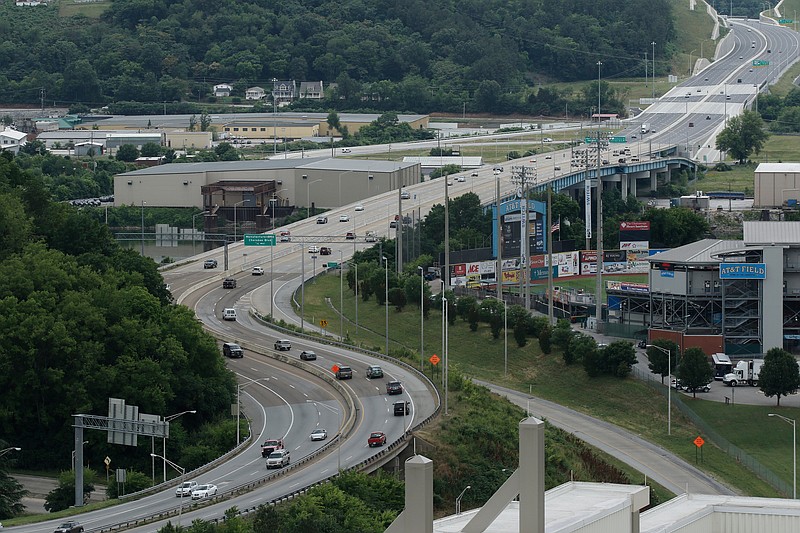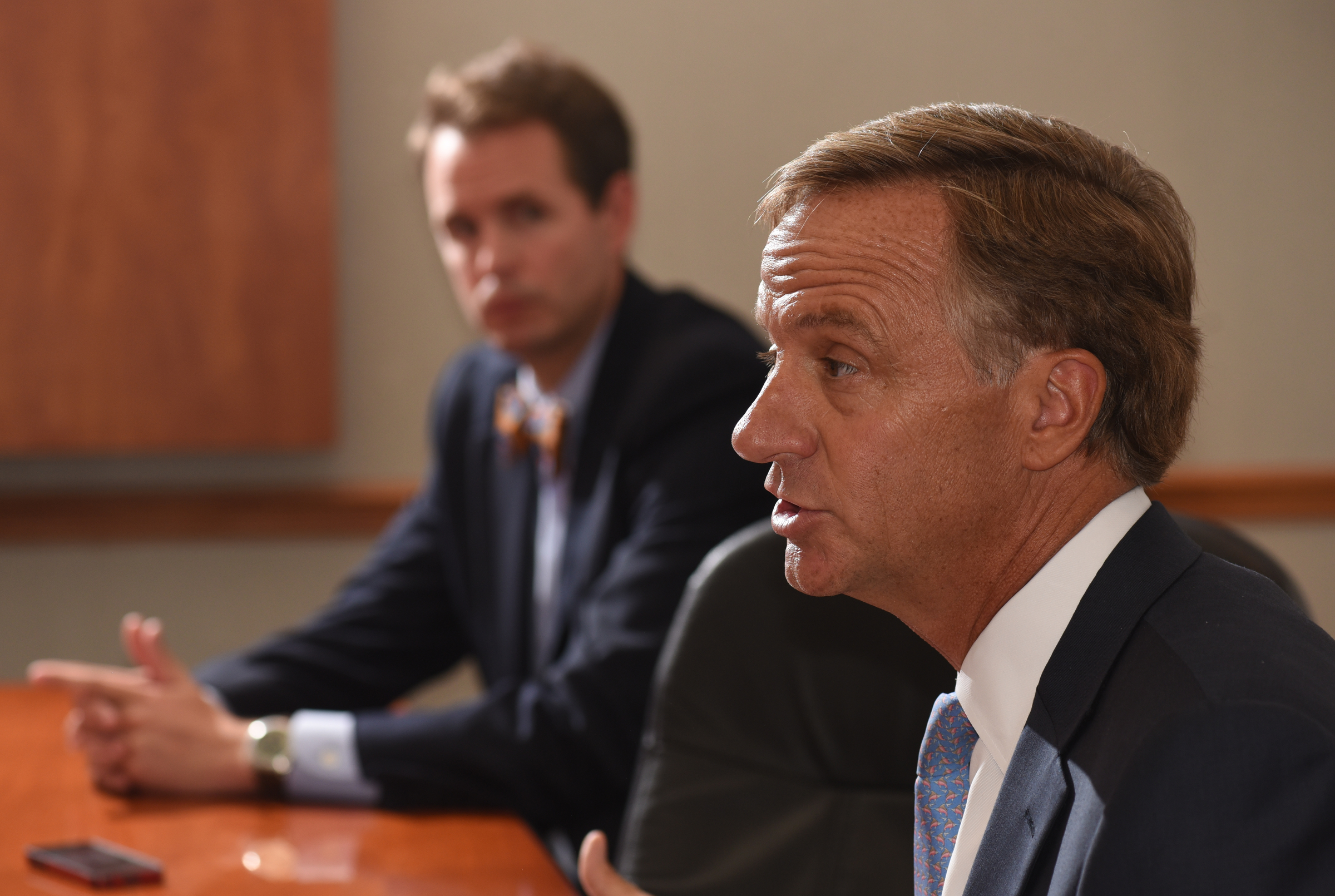Cost of projects
Here are costs for some of the Chattanooga and regional projects Gov. Bill Haslam is citing as he seeks to make the case for new state transportation funding:* In Chattanooga, the interchange modification project at the Interstate 75 and Interstate 24 split in Brainerd and East Ridge is estimated to cost $70 million. With an estimated 124,000 vehicles passing through daily the area is known for its notorious traffic jams.* Interchange modifications on I-24 at Broad Street (State Route 2) and Market Street (SR-58) is in development. It would upgrade ramps and improve access from I-24 to the south side of Chattanooga. Estimated cost: $37 million.* Apison Pike (SR-317) in the Collegedale area of Hamilton County has two widening projects planned from SR-321 (Ooltewah-Ringgold Road) to East Brainerd Road. It covers over four miles in length and would connect with a widening project currently under construction and complete improvements to the SR-317 corridor between I-75 and East Brainerd Road. Estimated cost: $36.1 million.* The widening of Bonny Oaks Drive (SR-317) from SR-17 to I-75 in Chattanooga. Its near the Enterprise South Industrial Park where Volkswagen and Amazon are located. The 4.8-mile project is in the environmental phase. Estimated cost: $63.1 million.* In Rhea County, an 8-mile section of SR-30 from U.S. 27/SR-29 to the Tennessee River Bridge is undergoing environmental studies. This road is a critical corridor in the region and has numerous safety issues. It also is a controlled evacuation route for TVA’s Watts Bar Nuclear Plant in the event of an emergency. Estimated cost: $70.1 million.* Improving more than 20 miles of U.S. 64/SR-40 through the Ocoee Gorge in Polk County. Now in the environmental study phase, it’s part of the long-envisioned Corridor K and would go west from Ocoee River to SR-68 in Ducktown. Estimated cost: $220 million to $1 billion.* In Bradley County, a 3.2-mile section of SR-60 from Westlake Drive to SR-306 is in development. A high rate of development along SR-60 has led to an increase in congestion. Estimated cost: $40.5 million.* SR-322 in Monroe County has two improvement projects on the books, totaling 7 miles. This road connects Sweetwater and Vonore. Estimated cost: $26.7 million.* In McMinn County, I-75 interchange improvements at and connection improvements to SR-30, SR-305 and U.S. 11/SR-2 are in the environmental phase. The project encompasses over six miles of roadway improvements. Estimated cost: $59 million.
Gov. Bill Haslam on Wednesday sought backing from Chattanooga and Cleveland business leaders for new transportation revenue he says will be needed to keep Tennessee highway projects going smoothly amid an estimated $6 billion statewide backlog.
With the Republican governor expected to wrap up his 15-city statewide tour today, Haslam and Transportation Commissioner John Schroer first met with Chattanooga Area Chamber of Commerce officials. They touted Tennessee's transportation needs while also hitting on bridges, safety issues, the impact transportation has on economic development efforts and the need to keep momentum going.
"The quality of Tennessee's transportation and infrastructure system always ranks at or near the top when compared to the rest of the country," Haslam said. "We have no transportation debt, and we do a great job maintaining our roads, but we know we have challenges on the horizon."
One Chattanooga project alone - the interchange modification project at the Interstate 75 and Interstate 24 split in Brainerd and East Ridge - is estimated at $70 million. With an estimated 124,000 vehicles passing through daily, the area is known for its notorious traffic jams.
But that's pea gravel compared to a plan to improve more than 20 miles of U.S. 64/SR-40 through the Ocoee Gorge in Polk County. Now in the environmental study phase, it's part of the long-envisioned Corridor K and would go west from the Ocoee River to SR-68 in Ducktown.
The estimated cost of completion? $220 million to $1 billion.
Moreover, Haslam said, "we know that we can't depend on the federal government to be the funding partner that it once was. We also know that, as our infrastructure ages, maintenance becomes more important and more expensive."
And without additional funding, maintenance needs will begin crowding out new construction, officials say.
A 2015 Tennessee comptroller's report on transportation funding warns that revenues aren't expected to be enough to maintain current infrastructure.
The state's road program is funded by users in the form of gas and diesel taxes. The state's 21.4-cent-per-gallon gas tax was last raised in 1989. Meanwhile, vehicles are more fuel efficient, labor costs are higher and Congress hasn't passed a long-term transportation funding bill in a decade.
Tennessee's population is larger than it was and is expected to grow even more - 2 million more by 2040. And that places greater demand on infrastructure, officials say.
Haslam has yet to specify proposed funding put before the General Assembly in 2016. He said he first wants to make the case on the need.
Besides fuel taxes, officials and lawmakers are discussing everything from new fees on electric vehicles to mileage fees for trucks using Tennessee roads.
But others are talking, too - against any gas-tax increase in 2016.
Americans for Prosperity-Tennessee President Andrew Ogles has his own road show and is seeking commitments from lawmakers to vote against an increase next year.
"Raising the gas tax is hurting the people who need the tax relief the most," Ogles said in a recent interview. Lawmakers, Ogles argued, "should turn their focus from tax increases to cutting wasteful spending; prioritizing roads and bridges over special pet projects and bike paths."
According to an AFP-Tennessee list, 15 senators in the 33-member Senate and 40 of 99 representatives in the House are opposed to an increase.
Meanwhile, Senate Speaker Ron Ramsey, R-Blountville, argues that some type of funding is necessary to keep state roads and highways going. But House Speaker Beth Harwell, R-Nashville, says the state should use surplus revenues derived from nonfuel tax sources to provide some temporary funding.
Senate Transportation Committee Chairman Jim Tracy, R-Shelbyville, opposes any gas tax increase next year. But Tracy, who intends to start his own tour later this month, said he believes new funding is needed. But regular Tennesseans need to be told what is happening and be encouraged to weigh in, he said.
"I think we're not there yet," Tracy said. "That's part of this tour."
The senator said he intends to invite citizens and legislators alike to his hearings to hear explanations about the needs from experts and to offer their ideas on solutions.
"This is something [we've] got to do from the ground up, to make sure citizens understand what we're doing," Tracy said.
The governor later traveled to Cleveland on Wednesday to make another pitch there. He concludes the tour today, visiting his hometown of Knoxville and other communities.
Staff writer Ellis Smith contributed to this story.
Contact staff writer Andy Sher at 615-255-0550 or asher@timesfreepress.com.

